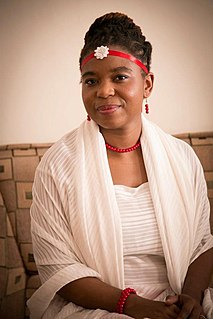A Quote by Grace Lee Boggs
Really, people are not a school of fish. Finding the leaders of the future is a question of recognizing those people who give leadership in a crisis.
Related Quotes
In every crisis, people do not respond like a school of fish. Some people become immobilized. Some people become very angry, some commit suicide, and other people begin to find solutions. And visionary organizers look at those people, recognize them and encourage them, and they become leaders of the future.
We need to do what I call visionary organizing. Recognize that in every crisis, people do not respond like a school of fish. Some people become immobilized. Some people become very angry, some commit suicide, and other people begin to find solutions. And visionary organizers look at those people, recognize them and encourage them, and they become leaders of the future.
People look at the future and see a black hole. They look at climate change and see an ecological crisis. They look at their leaders corrupted by money and see a political crisis. They wonder if they'll ever be able to pay off their student loan or own a house. Given this ecological, political and financial crisis, what they want is a different future. Their fundamental demand is a different regime to provide that future.
Leadership is the name that people use to make sense out of complex events and the outcomes of events they otherwise would not be able to explain. In other words, people attribute leadership to certain individuals who are called leaders because people want to believe that leaders cause things to happen rather than have to explain causality by understanding complex social forces or analyzing the dynamic interaction among people, events, and environment.
When you coach and teach leadership, most people think about them. It's like you're the leader and how do you influence them. Clearly, leaders do take their followers, their flock, their enterprise, their business - whatever - hopefully to a better place. But I think the foundation of what makes really great leaders is they lead themselves, and they're conscious about knowing themselves and coaching and leading themselves in a very profound way. The simplest of us talk to ourselves. The question is, "Do we really lead ourselves?"
I think the characteristics of really effective leaders when people are frightened and depressed are the same qualities that leaders need when people are optimistic. The difference is when people are frightened the need for these few qualities becomes much stronger because frightened people are desperate to have someone they can trust and believe in and who seems to be able to create a better future.
More and more, leadership, whether it's profit or nonprofit, is about recruiting and keeping talented people. That's the biggest challenge. Yes, you've got to create systems that will enable people easily to innovate continuously; you've got to be a system-builder. But finding and keeping geeks and shrinks is the biggest challenge. That means leaders have got to be salespeople, they've got to be recruiters, and they've got to be actively able to understand and keep the talent they have. Leadership is courtship. That's what it's becoming.
In addition to all of the ratios and goals and parameters and bottom lines, it is fundamental that leaders endorse a concept of persons. This begins with an understanding of the diversity of people's gifts and talents and skills. Recognizing diversity gives us the chance to provide meaning, fulfillment and purpose, which are not to be relegated solely to private life any more than such things as love, beauty and joy. The art of leadership lies in polishing and liberating and enabling those gifts.
To my mind, you cannot speak about the need for leadership within our communities without being prepared to take on responsibility yourself. It's not enough to point the finger at those who have let us down and to expect others to come forward and fix our problems. Nor can anyone afford to call themselves a leader unless they truly have the interests of our community at heart. Too many people like to think they are leaders and too many are identified by the media as leaders who are not really leaders at all.
































